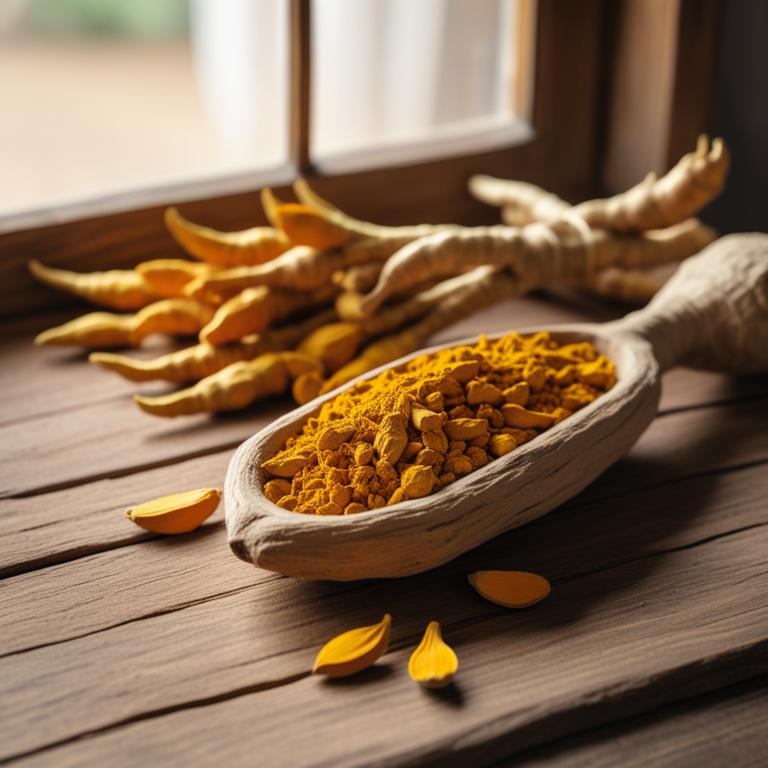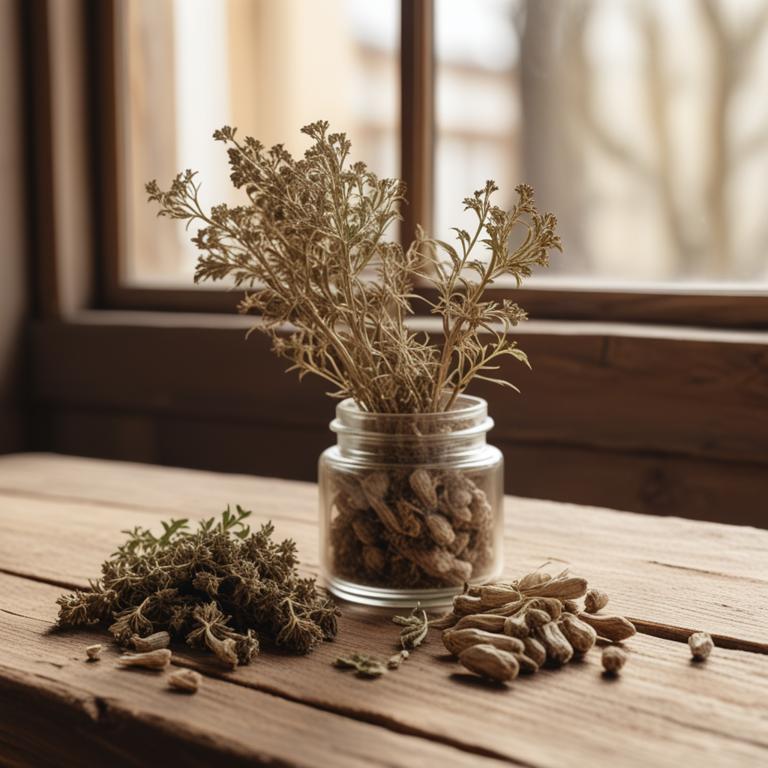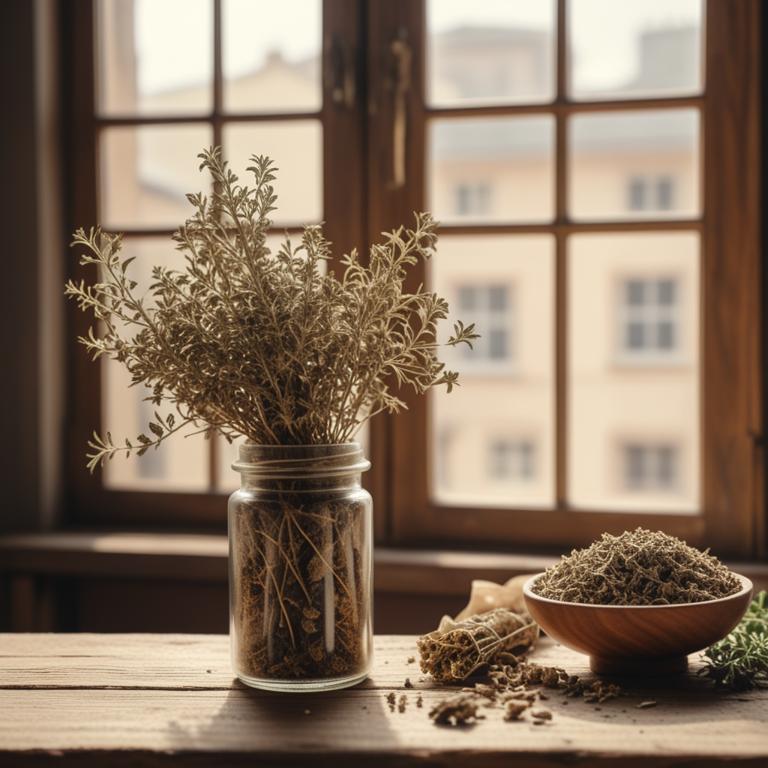Updated: Dec 1, 2024
Vomiting: Understanding the Causes and Natural Remedies with Medicinal Herbs and Herbal Preparations

Vomiting is a condition where the body throws out the food from the stomach.
It's not just uncomfortable, but it can also lead to dehydration, fatigue, and other health issues. Vomiting can disrupt your daily life, making it hard to eat, sleep, and even work. It can be caused by food poisoning, infections, stress, anxiety, or even pregnancy. When we're experiencing vomiting, our body is trying to get rid of something it doesn't like. The causes can vary, but they often involve an imbalance in the body's systems. Some people may experience vomiting as a side effect of medication or due to an underlying medical condition. Herbal remedies can help alleviate vomiting symptoms.
Ginger, for example, has natural anti-inflammatory properties that can soothe the stomach and reduce nausea. Peppermint oil and chamomile tea can also calm the digestive system and ease discomfort. Licorice root is another herb that's often used to treat vomiting, as it helps to balance the body's electrolytes and fluids. To use these herbs, you can try ginger tea by steeping fresh ginger in hot water. You can also add peppermint oil to your bath water or inhale its vapor to calm your stomach. Chamomile tea is easy to make by steeping dried chamomile flowers in hot water. Licorice root can be made into a tea or taken in capsule form.
These herbal preparations can help to alleviate vomiting symptoms and get you back on track.
Table of Contents
- What are the causes of vomiting in general?
- What advantages can be gained from using herbs to alleviate vomiting?
- What are the primary medicinal herbs used to prevent vomiting?
- What are the top herbal preparations used to alleviate vomiting?
- What herbs should be avoided if you're experiencing vomiting?
- FAQ
What are the causes of vomiting in general?
The main causes of vomiting are often related to the body's reaction to something that has gone wrong inside.
Food poisoning happens when we eat something contaminated with bacteria, viruses, or other germs. These germs can cause our stomach to get upset and lead to vomiting. This can occur when food is not handled or cooked properly, or if it's left at room temperature for too long. Motion sickness is another common cause of vomiting. It occurs when our body gets confused by the movement of a car, boat, or plane.
Our inner ear, which helps us balance, sends mixed signals to our brain, causing our body to feel queasy and leading to vomiting. Viral gastroenteritis, often known as stomach flu, is a highly contagious infection that causes vomiting and diarrhea. It's usually spread through close contact with someone who's infected or by touching contaminated surfaces. The virus attacks the lining of our stomach and intestines, leading to inflammation and vomiting. Bacterial gastroenteritis is similar to viral gastroenteritis but is caused by bacteria like Salmonella or E. coli. These bacteria can be found in contaminated food or water, and can lead to vomiting and diarrhea.
In some cases, bacterial gastroenteritis can be severe and even life-threatening.
What advantages can be gained from using herbs to alleviate vomiting?
Using herbs for vomiting can be really helpful.
These plants have been used for a long time to calm the stomach and stop vomiting. One of the main benefits is that they can quickly ease nausea and discomfort. Some herbs have anti-inflammatory properties, which can help reduce swelling in the stomach and make vomiting worse.
Others have natural chemicals that can help calm the muscles in the stomach and stop spasms. This can be especially helpful for people who are experiencing vomiting due to stomach problems or food poisoning. Using herbs for vomiting can also be a natural and gentle way to treat the symptoms, without the need for harsh medications. Some herbs can also help replace lost fluids and electrolytes, which is important for people who are vomiting a lot.
This can help prevent dehydration and other complications.
What are the primary medicinal herbs used to prevent vomiting?

When it comes to vomiting, some herbs can help calm the stomach and reduce nausea.
Glycyrrhiza glabra, or licorice root, is known for its soothing properties that can help reduce inflammation in the stomach, making it a good choice for soothing stomach upset. Zingiber officinale, or ginger, has anti-inflammatory compounds that can help alleviate nausea and vomiting. It's often used in teas, soups, and other foods to calm the stomach. Cinchona officinalis, or Peruvian bark, contains quinine, a compound that can help reduce nausea and vomiting.
It's traditionally used to treat malaria, but its anti-nausea properties are also beneficial. Ginkgo biloba may seem like an unusual choice, but its leaves have anti-inflammatory compounds that can help soothe the stomach and reduce nausea. It's also known to help improve blood flow, which can aid in digestion. Foeniculum vulgare, or fennel, contains compounds that can help relax the muscles in the stomach, reducing cramps and nausea. Its seeds and leaves are often used in teas and dishes to calm the stomach.
These herbs can be consumed in various forms, such as teas, soups, or capsules, but it's essential to consult with a healthcare professional before using them to treat vomiting, especially if the cause is unknown or severe.
What are the top herbal preparations used to alleviate vomiting?

Herbal preparations are good for vomiting because they can help calm the stomach and reduce nausea.
A decoction is a liquid extract made by boiling herbs in water, which can be soothing for the stomach. Decoctions can be made with herbs like ginger and peppermint, which are known for their calming effects. A tincture is a concentrated liquid extract made by soaking herbs in a solvent, like alcohol or glycerin. Tinctures can be taken in small amounts and are often used to treat nausea and vomiting. For example, a tincture made from the herb ginger can be taken to calm the stomach and reduce vomiting.
Herbal teas, or infusions, are made by steeping herbs in hot water, which can help to calm the stomach and reduce nausea. Herbal teas can be made with herbs like chamomile and lemon balm, which are known for their calming effects. Another option is an infusion, which is similar to a tea but often uses a longer steeping time and may include other ingredients like honey or lemon. Infusions can be made with herbs like peppermint and ginger to help calm the stomach and reduce nausea. Finally, a poultice is a paste made from crushed herbs that can be applied directly to the skin.
Poultices can be made with herbs like ginger and turmeric, which have anti-inflammatory properties that can help to reduce nausea and vomiting.
Additional Resources:
What herbs should be avoided if you're experiencing vomiting?
If you're experiencing vomiting, it's crucial to be mindful of certain herbs that might make things worse.
Taxus baccata, also known as yew, contains toxic compounds that can cause severe nausea, vomiting, and even liver damage if ingested in large amounts. Hyoscyamus niger, or henbane, has a long history of use in traditional medicine, but it can also induce intense vomiting, along with other unpleasant symptoms like diarrhea and stomach cramps.
Strychnos nux-vomica, or Indian poison nut, is a highly toxic herb that can cause severe vomiting, muscle spasms, and even seizures in some cases. Rauvolfia serpentina, or snake plant, contains powerful compounds that can trigger extreme vomiting, dizziness, and stomach problems if not used carefully. Aconitum napellus, or monk's hood, is another herb that can cause severe vomiting, along with numbness, dizziness, and even cardiac problems in rare cases.
If you're experiencing vomiting, it's best to steer clear of these herbs and consult with a healthcare professional for proper guidance.
FAQ
Are there any specific herbs that can prevent vomiting?
Ginger has long been known to help with nausea.
It's often used in herbal remedies to calm the stomach. Peppermint oil, which is often associated with calming the digestive system, can also be beneficial.
Some herbal teas, like those made from licorice root, may also help soothe an upset stomach and prevent vomiting.
Is it safe to use herbal remedies for vomiting during pregnancy?
It's generally not recommended to use herbal remedies for vomiting during pregnancy.
Some herbs can cause harm to the mother or the baby. For example, pennyroyal and blue cohosh can cause bleeding or birth defects. The effects of herbal remedies can vary and are often not studied thoroughly.
It's best to stick with what's known to be safe.
Are there any herbs that can reduce the frequency of vomiting?
Ginger has been shown to help reduce nausea and vomiting in some people.
It's thought to work by calming the stomach and reducing inflammation. Many people find relief by drinking ginger tea or taking ginger supplements.
Some studies suggest it may be especially helpful for people experiencing chemotherapy-induced nausea.
Related Articles

Cirrhosis Causes and Prevention with Medicinal Herbs and Herbs

Sour Taste in Mouth: A Guide to Medicinal Herbs and Preparations

Understanding Chronic Hepatitis: Causes and Effective Herbal Remedies

Cholecystitis: Causes, Symptoms, Medicinal Herbs, and Therapeutic Herbal Preparations

Stomach Growling: Understanding Causes, Prevention, and Herbal Remedies






